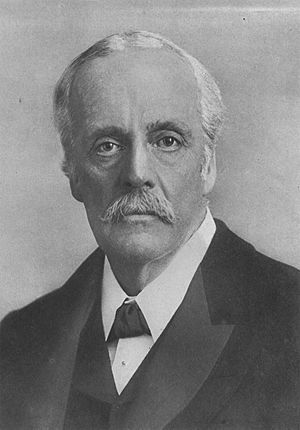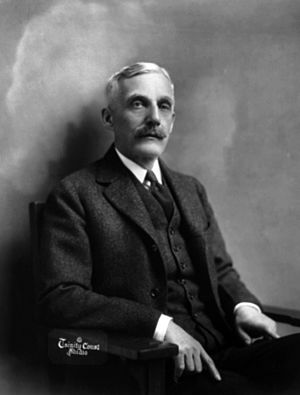Balfour Note facts for kids

The Balfour Note was an important letter sent on August 1, 1922. It was signed by Arthur Balfour, who was temporarily in charge of foreign affairs for Britain. This letter went to countries that owed Britain money after World War I, like France, Italy, Yugoslavia, Romania, Portugal, and Greece.
Balfour explained that Britain needed these countries to pay back their loans. He also said that Germany needed to pay its war reparations. This was because Britain itself owed a lot of money to the United States.
Contents
Why Britain Sent the Note
During World War I, Britain needed many military supplies. They bought a lot of these supplies from America. Much of these supplies were then used by Britain's allies, like France and Italy.
Britain owed America about £850 million. But other countries owed Britain much more. For example, Germany owed £1.45 billion in reparations. Britain's allies owed another £1.3 billion. In total, countries owed Britain almost four times what Britain owed America.
What the Balfour Note Said
Balfour explained that Britain had not yet asked its allies to pay back their war debts. They hadn't even asked for interest on these loans. However, the American government was now asking Britain to pay back its own debt. America wanted Britain to start paying interest and to pay off the loan over 25 years.
Balfour pointed out that all these debts were connected. He suggested that if Britain had to pay America, then Britain would need to collect money from its own debtors.
A Plan to Cancel Debts
The British government offered a solution. They were willing to cancel all the money owed to Britain by its allies. They would also cancel the reparations owed by Germany. This would happen if America also agreed to adjust the debts owed by Britain.
Balfour explained that Britain would not ask for more money than it needed to pay its own creditors. He also reminded everyone that Britain's debts to America were mostly for helping other countries. Britain had used its own money for its huge war effort. But other European nations couldn't do the same. So, they asked the United States for help. The US agreed to lend money, but only if Britain promised to pay it back.
Problems with Too Much Debt
Balfour also warned about the problems caused by so much international debt. He said that too much debt between countries hurt the world's economy. It made it harder for countries to trade and for businesses to grow. He believed that these debts were stopping the world from returning to normal after the war.
How Countries Reacted
The Balfour Note was not popular in the United States. Many Americans were upset by it. Andrew W. Mellon, who was the US Secretary of the Treasury, called the Note "a lie."
Another US official, Seymour Parker Gilbert, said the Note was almost like Britain refusing to pay its debts. He found it annoying that Britain kept saying their loans from the US were mainly to help Britain's allies.
Text of Note
The full text of the Balfour Note is a long and detailed document. It explains Britain's position on war debts and reparations in more detail.
 | Kyle Baker |
 | Joseph Yoakum |
 | Laura Wheeler Waring |
 | Henry Ossawa Tanner |


